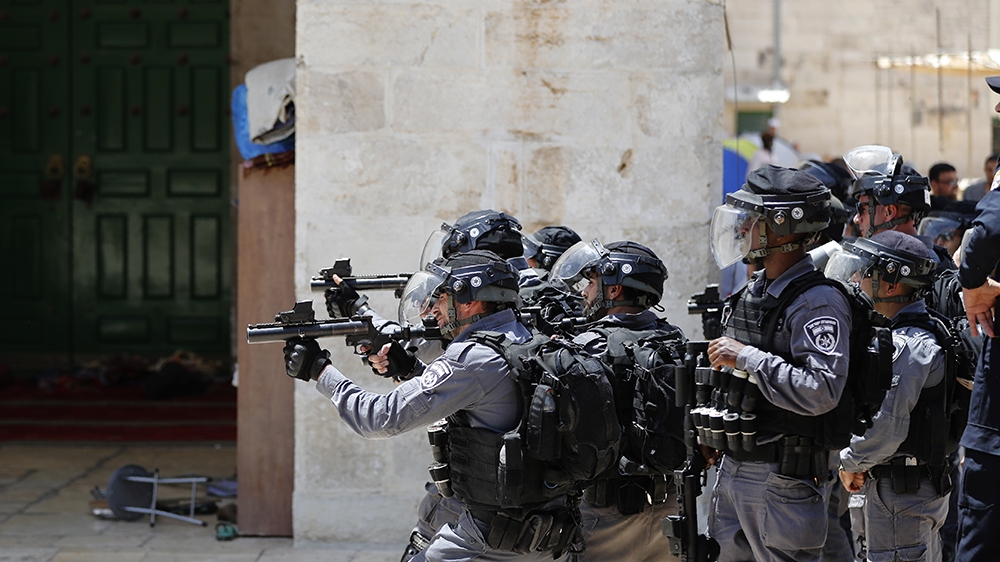Israeli forces and settlers enter Al-Aqsa Mosque compound
Protests erupted on Sunday after Israeli forces entered the Al-Aqsa Mosque compound along with hundreds of ultra-nationalist Jews whom they allowed to access the compound on Jerusalem Day – when Israelis celebrate the anniversary of their occupation of East Jerusalem at the end of the 1967 Arab-Israeli war.
The Muslim Waqf organisation which oversees the mosque compound – the third holiest site in Islam – said police used rubber bullets and pepper spray and arrested seven people.
One Palestinian man suffered a head injury, while others were treated for gas inhalation inside the compound, a medic from the Palestinian Red Crescent said.
It was the first time in about 30 years that Jews were allowed into the site during the final days of the fasting month of Ramadan, which coincided this year with the Israelinational holiday commemorating control over the city.
Al-Aqsa mosque director Omar al-Kiswani accused Israel of violating an agreement not to allow such visits during the last days of Ramadan.
Earlier in the morning, Israeli police had deployed hundreds of their forces around the mosque compound and across the city as hundreds of Jews waited at the compound gates to enter.
Watch | Israeli police raid the southern ceiled building in the Al-Aqsa Mosque and intimidate the Muslim worshippers, today. pic.twitter.com/Y6SPtRau4r
— Quds News Network (@QudsNen) June 2, 2019
Israeli police decision
Reporting from West Jerusalem, Al Jazeera’s Harry Fawcett said: “What had been announced was that Jews would not be allowed into the Al-Aqsa Mosque compound because of the sensitivity coming up to the end of Ramadan.”
“But what actually took place was that hundreds of what we would expect to be right-wing settler and religious nationalists assembled at the gate demanding entrance.
“Once the police had apparently decided they would be allowed in, protests by Palestinians started and forces moved in to put down the demonstrations. At that point, the Jewish settlers were allowed to come in,” said Fawcett.
Video inside the compound showed Palestinians shouting “Allahu Akbar” (God is great) and throwing chairs and other objects at a doorway before tear gas and stun bombs were thrown at them.
Thousands of Jews have also flocked to the nearby Western Wall to mark the occasion ahead of celebrations and marches that will be held around the city in the afternoon and in the evening.
Watch | Palestinian Muslim worshippers face to face with Israeli police officers trying to raid the southern building of the holy Al-Aqsa Mosque in occupied Jerusalem, today. pic.twitter.com/3Fwq9bd1LF
— Quds News Network (@QudsNen) June 2, 2019
The annual march through the city, including the Muslim quarter of the Old City which forces Palestinians to shutter their businesses, often sparks clashes.
Security measures have been tightened and police are on high alert after a Palestinian teenager was shot dead by Israeli forces as he tried to enter occupied East Jerusalem to offer Friday prayers at the Al-Aqsa Mosque compound.
‘An act of ‘terror’
Palestinian political parties condemned the incident.
Fatah, the party that leads the Ramallah-based Palestinian Authority, described the incident as an act of “terror”.
Hamas, the group that governs the besieged Gaza Strip, said the Palestinian people’s stance and perseverance indicated their refusal of the “occupation’s policies” that aimed to change the status quo of the al-Aqsa mosque compound.
The Popular Front for the Liberation of Palestine (PFLP) said the incident marked a new escalation that confirms the “occupation’s intent to Judaize” al-Aqsa. It also said the incident was an attempt by Israeli Prime Minister Benjamin Netanyahu’s right wing party to advance politically, especially after planning on dissolving the Knesset.
In a separate incident on Friday, a Palestinian man was shot dead by Israeli police after an alleged stabbing attack on two Israelis in the Old City of East Jerusalem.
The Al-Aqsa Mosque, located inside the 35-acre compound, is referred to as al-Haram al-Sharif, or the Noble Sanctuary, by Muslims, and as the Temple Mount by Jews.
The compound’s Western Wall, known as the Wailing Wall to Jews, is believed to be the last remnant of the Second Temple, while Muslims refer to it as al-Buraq Wall and believe it is where the Prophet Muhammad tied al-Buraq, the animal upon which he ascended to the sky and spoke to God.
The area has always been closed to Jews during the last 10 days of Ramadan, when large numbers of Muslim worshippers stay at the site.
“The police really aren’t giving any explanation as to why they made this decision,” Al Jazeera’s Fawcett said.
“The police spokesman is merely saying that access to non-Muslims was allowed today as it is on any normal day” but didn’t acknowledge the Israeli holiday or that it was the end of Ramadan.
The last time when Jerusalem Day coincided with the end of Ramadan in 1988, the Al-Aqsa Mosque compound was closed to Jews.





